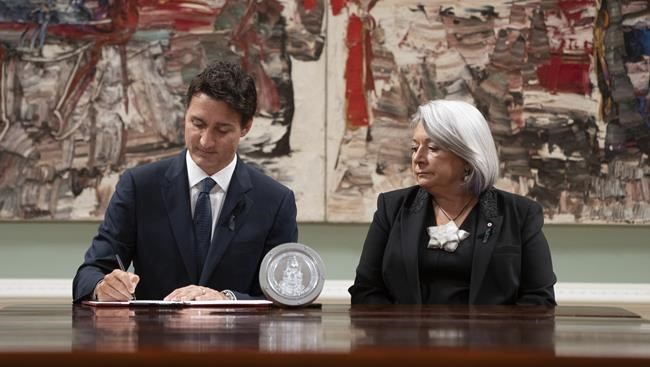OTTAWA — King Charles III was proclaimed Canada's head of state on Saturday at a ceremony that included heraldic trumpeting, a 21-gun salute and a moment of remembrance for his mother, Queen Elizabeth II.
Prime Minister Justin Trudeau arrived at Rideau Hall at about 10 a.m. with his youngest son Hadrien and laid flowers at a makeshift memorial for the Queen, who died Thursday.
He and members of the federal cabinet and Privy Council met before the ceremony as part of the protocol needed to formally proclaim the new sovereign.
The prime minister asked Gov. Gen. Mary Simon for permission to proceed, and after she said yes both signed the order-in-council proclaiming the accession.
The solemn moment unfolded at the same table used by Queen Elizabeth II during her first official visit to Canada in October 1957, and was followed by a round of applause from those gathered in the Rideau Hall ballroom.
Dr. Samy Khalid, the chief herald of Canada, led a procession outside moments later. After a fanfare played on heraldic trumpets, he read the proclamation of the accession in both official languages.
"We (the Governor General and the Privy Council) proclaim that His Royal Highness Prince Charles Philip Arthur George is now by the death of our late sovereign, Charles III, by the grace of God of the United Kingdom, Canada and his other realms and territories, King, head of the Commonwealth, defender of the faith to whom we acknowledge faith and allegiance," said Khalid.
"Long live the King," he concluded, with those gathered repeating the phrase.
Members of the Royal Canadian Armed Forces fired an artillery salute as Khalid spoke. The guns were accidentally set off earlier than planned and sounded throughout the French portion of the proclamation — perhaps a sign that, despite the advance planning for Saturday's event, it has been seven decades since a royal accession ceremony was held in Canada.
Khalid took the glitch in stride, calling it understandable and saying it was a momentous occasion nonetheless.
"Of course there's been a lot of emotions, there has been a lot going on behind these doors for the past few days," he said, motioning toward Rideau Hall's main entrance.
He acknowledged the ceremony and his garb — which included a royal blue tabard, a sleeveless garment worn by medieval peasants and clerics — are a callback to a much earlier time. Khalid noted the tabard was designed with Indigenous elements in addition to Royal symbols.
"I hope that the people of Canada will see that we wanted to mark this momentous occasion in a very symbolic way," he said.
The Canadian flag was raised to mark the accession of the new sovereign, but was later lowered to half-mast as mourning for the queen continues.
A number of provinces, such as Nova Scotia, New Brunswick and Saskatchewan, held similar accession ceremonies on Saturday.
Meanwhile, the federal government is preparing a series of events to commemorate the legacy of Queen Elizabeth II.
Protocol calls for 10 days of mourning following the Queen's death, and British officials announced on Saturday that the Queen's state funeral will take place at Westminster Abbey on Sept. 19.
Canada's national commemoration will take place the same day, including a parade, a flypast and a 96-gun salute to mark each year of the queen's life.
A nationally televised service will be held at Anglican Christ Church Cathedral in Ottawa, where Queen Elizabeth and her husband Prince Philip worshipped on two occasions in 1957 and 1961.
Christ Church hosted a similar national commemoration when Philip died last year and another for the death of the Queen Mother in 2002.
Trudeau confirmed Saturday evening that Parliament will reconvene for the fall sitting on Sept. 20, instead of Sept. 19 as previously scheduled, to accommodate the Queen's funeral.
Before the date of the Queen's funeral was announced, Privy Council President Dominic LeBlanc said it's important for the members of the House of Commons and the Senate to have an opportunity to honour the Queen's service to Canada.
"We're currently reflecting on the most appropriate way to do that," he said.
Government House leader Mark Holland announced Saturday evening that the House of Commons will sit on Thursday for a special session, "to commemorate Canada’s longest-reigning Sovereign, Her Majesty Queen Elizabeth II."
This report by The Canadian Press was first published Sept. 10, 2022.
— With files from Michael Tutton in Halifax and Lee Berthiaume in Ottawa.
Sarah Ritchie, The Canadian Press

